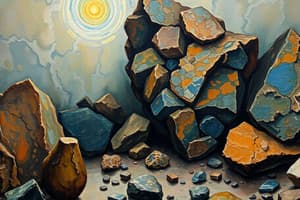Podcast
Questions and Answers
What are minerals?
What are minerals?
Solid inorganic materials that occur naturally, with a crystalline structure, defined chemical composition, and homogeneous mixture.
Which of the following best describes rocks?
Which of the following best describes rocks?
- Aggregates of organic materials
- Pure chemical substances
- Aggregates of inorganic materials (correct)
- Completely gaseous substances
Soil is a mixture of decayed organic compounds and broken down ______.
Soil is a mixture of decayed organic compounds and broken down ______.
rocks and minerals
What is water made up of?
What is water made up of?
Which of these is a characteristic of minerals?
Which of these is a characteristic of minerals?
What is solid-state diffusion in mineral formation?
What is solid-state diffusion in mineral formation?
Silicates contain silicon and oxygen as their fundamental building block.
Silicates contain silicon and oxygen as their fundamental building block.
Name a non-metallic mineral.
Name a non-metallic mineral.
Which of the following is a type of rock?
Which of the following is a type of rock?
Fossil fuels include coal, oil, and ______.
Fossil fuels include coal, oil, and ______.
Which of the following is a renewable energy source?
Which of the following is a renewable energy source?
Flashcards are hidden until you start studying
Study Notes
Earth Materials Overview
- Minerals are solid, naturally occurring inorganic materials with a crystalline structure and definite chemical composition.
- Rocks are aggregates consisting of minerals or mineral-like substances.
- Soil is composed of decayed organic matter mixed with broken down rocks and minerals.
- Water, a vital molecule made of hydrogen and oxygen, is essential for life.
- Energy sources are classified into renewable (inexhaustible) and non-renewable (depletable).
Characteristics of Minerals
- Minerals are solid at room temperature.
- They possess a distinct crystalline structure.
- Inorganic classification means they are not derived from living organisms.
- Each mineral has a definable chemical composition.
- Minerals exhibit homogeneity throughout their structure.
- Naturally occurring in the Earth's crust.
Formation of Minerals
- Solidification of a melt occurs when liquid substances freeze to form solid minerals.
- Precipitation from a solution happens when atoms or ions bond and crystallize upon evaporation.
- Solid-state diffusion involves atomic movement through solid matrices.
- Biomineralization is the process by which animals create minerals to strengthen tissues.
- Fumarolic mineralization refers to the precipitation of minerals from volcanic gases.
Physical Properties of Minerals
- Crystal Form: Reflects the internal atomic arrangement.
- Luster: Determines light reflection quality (metallic vs. non-metallic).
- Color: Often unreliable; can vary in different specimens.
- Streak: The color observed when a mineral is powdered.
- Cleavage: The tendency of minerals to break along defined planes.
- Fracture: Describes the mineral's breaking pattern (e.g., quartz).
- Specific Gravity: Ratio of mineral weight to an equal volume of water.
- Hardness: A measure of resistance to scratching and abrasion.
Types of Minerals
- Metallic Minerals*
- Examples include iron, nickel, copper, gold, silver, chromium, zinc, mercury, lead, and platinum.
- Non-metallic Minerals*
- Examples include silica, clay, and marble.
Mineral Groups
- Silicates*
- Predominant in the Earth's crust, containing silicon and oxygen.
- Built around the silicon-oxygen tetrahedron (SiO₄).
- Include quartz (SiO₂), feldspar, mica, olivine, pyroxene, and amphibole.
- Non-silicates*
- Lack silicon-oxygen tetrahedra.
- Composed of chemical elements like carbonates, sulfates, oxides, and halides.
- Notable examples:
- Carbonates: Calcite (CaCO₃) found in limestone.
- Sulfates: Gypsum (CaSO₄·2H₂O), used in construction.
- Oxides: Hematite (Fe₂O₃) and magnetite (Fe₃O₄) are essential iron ores.
- Halides: Rock salt (Halite, NaCl).
- Sulfides: Pyrite (FeS₂), known as fool's gold.
Types of Rocks
- Igneous Rocks: Form from molten material, categorized as intrusive (coarse-grained) or extrusive (fine-grained).
- Sedimentary Rocks: Formed from sediment deposits, divided into clastic, chemical, and organic types.
- Metamorphic Rocks: Result from existing rocks altered under high pressure and temperature, including both foliated and non-foliated varieties.
Energy Resources
- Non-renewable Energy Sources*
- Fossil fuels derived from ancient organisms include:
- Coal: A solid fossil fuel, mainly used for electricity generation.
- Oil: A liquid fossil fuel, processed for various applications.
- Natural Gas: Primarily methane, used in cooking and heating.
- Renewable Energy Sources*
- Solar Energy: Generates electricity from sunlight.
- Wind Energy: Converts wind motion into electrical energy.
- Geothermal Energy: Harnesses heat from beneath the Earth's surface.
- Hydroelectric Energy: Utilizes flowing water to produce electricity.
- Biomass: Fuel and energy derived from organic materials.
- Nuclear Energy: Electricity generated through nuclear fission processes.
Studying That Suits You
Use AI to generate personalized quizzes and flashcards to suit your learning preferences.




